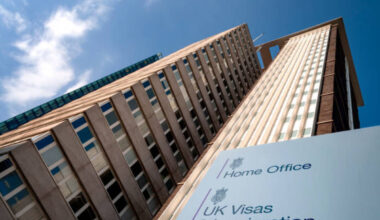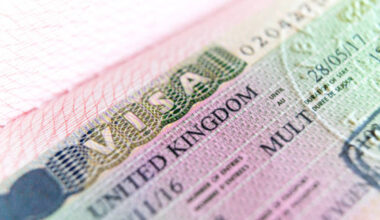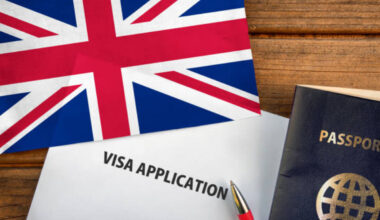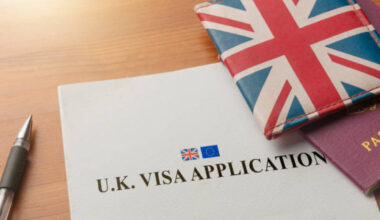With its world-class universities, cultural diversity, and career opportunities, the United Kingdom is one of the top destinations for international students. A UK Study Visa is the key to realizing a dream of studying in the UK.
Throughout this guide, you will learn about the requirements, benefits, and sponsorship options for obtaining a UK Study Visa.
What Is a UK Study Visa?
The UK Study Visa allows international students to study at higher education institutions in the UK.
Student Visas are designed for international students who plan to study in the UK at a recognized educational institution. This visa, called Tier 4 (General) Student Visa is now classified under the Student Visa category.
Types of Study Visas in the UK
Study visas in the UK are available at various levels of education and for different durations of stay. The main categories are as follows:
Advertisement
1. Student Visa (General)
Students aged 16 or older who intend to pursue higher education in a UK institution are eligible to apply for this visa.
2. Child Student Visa
The visa is designed for students aged 4 to 17 who would like to study at an independent school in the UK.
3. Short-Term Study Visa
The visa is suitable for short courses or English language programs lasting up to 6 or 11 months.
4. Graduate Visa
This visa is for students with a degree from the UK who are planning to work or look for employment for a period of two years (three years for PhD graduates).
Eligibility Requirements for a UK Study Visa
To apply for a UK Study Visa, you must meet specific eligibility criteria:
1. Confirmation of Acceptance for Studies (CAS)
In order to study in the UK, you must receive an unconditional offer from a licensed educational institution. Your visa application requires a CAS reference number, which the institution will provide.
2. Financial Proof
It is important that you show evidence that you have sufficient funds to cover tuition fees and living expenses. Depending on where you study and how long the course lasts, you will need to pay a specific amount.
3. English Language Proficiency
It is mandatory to provide proof of English language proficiency. Among the approved tests are IELTS, TOEFL, and others by UK Visas and Immigration (UKVI).
4. Health and Immigration Health Surcharge
Immigration Health Surcharges (IHS) must be paid as part of visa applications. The NHS (National Health Service) is accessed through this program.
5. Academic and Age Requirements
Students must meet the academic qualifications required for their chosen course and fall within the eligible age group for the visa type.
How to Apply for a UK Study Visa
There are several steps involved in applying for a UK Study Visa. An overview of the process can be found here:
Step 1: Choose Your Course and Institution
Ensure the institution is a Tier 4 sponsor before selecting a course.
Step 2: Receive a Confirmation of Acceptance for Studies (CAS)
You will receive a CAS from your institution once you have been accepted, which is a key document for your visa application.
Step 3: Gather Required Documents
Prepare the necessary documents, including:
-
CAS reference number
-
Passport
-
Financial evidence
-
Proof of English proficiency
-
Tuberculosis (TB) test results (if applicable)
Step 4: Submit Your Online Application
Visit the UK Visas and Immigration website and complete the online application form.
Step 5: Pay the Fees
Pay the visa application fee along with the Immigration Health Surcharge (IHS).
Step 6: Biometric Appointment
You will be required to provide fingerprints and a photograph at a Visa Application Centre (VAC).
Step 7: Wait for a Decision
It usually takes three weeks for a decision to be made once a submission has been made. There is an additional fee for expedited services.
Documents Required for a UK Study Visa
Applicants for UK Study Visas must submit the following documents:
-
A valid passport or travel document.
-
Confirmation of Acceptance for Studies (CAS).
-
Proof of financial capacity.
-
Tuberculosis (TB) test results (if applicable).
-
English language proficiency certificate.
-
Immigration Health Surcharge (IHS) receipt.
-
Academic transcripts and qualifications.
-
Any additional documents specified by your institution or the UKVI.
Financial Requirements for UK Study Visa
Demonstrating financial stability is one of the most important aspects of your visa application. You should know the following:
1. Tuition Fees
Your CAS must state that you have enough funds to pay for tuition for the first year.
2. Living Expenses
It is necessary for students to demonstrate that they are financially independent. Your study location will determine the amount required:
-
London: £1,334 per month for up to 9 months.
-
Outside London: £1,023 per month for up to 9 months.
3. Acceptable Financial Evidence
Proof of funds can include:
-
Bank statements.
-
Fixed deposit certificates.
-
Scholarship award letters (if applicable).
Visa Sponsorship for UK Study Visa
A visa sponsorship is a crucial part of studying in the UK. Sponsors are licensed institutions that provide students with CASs. The sponsorship process is as follows:
1. Role of the Institution
The educational institution is responsible for:
-
Issuing a CAS after enrollment.
-
Reporting to the UKVI about student attendance and compliance.
2. Maintaining Sponsorship
In order to maintain their sponsorship, students must adhere to the visa conditions, which include full-time study and compliance with attendance requirements.
3. Sponsored Scholarships
Scholarships like Chevening and Commonwealth are also sponsors, providing both financial and visa support.
Post-Study Opportunities in the UK
An advantage of a UK Study Visa is the array of job opportunities available after graduation. Among the options are:
1. Graduate Visa
Upon graduation, students are allowed to stay and work in the UK for two years (three years for PhD graduates).
2. Skilled Worker Visa
Graduates are able to transition to this visa once they find a job with an authorized UK employer.
3. Start-Up and Innovator Visas
Entrepreneurial graduates who want to set up a business the UK the visas offered by these programs provide the possibility of a path.
Common Challenges in the UK Study Visa Process
The process for applying for visas isn’t easy Many students are faced with issues such as
-
Unsatisfactory Financial Documentation Incorrect or unsatisfactory evidence of funds can result in visa refusal.
-
Incorrect communication with institutions delays in the receipt of the CAS may affect the timeline of application.
-
language barriers Not being able to satisfy requirements for English requirements for proficiency is a regular occurrence.
Tips for a Successful Visa Application
To assure a smooth application Follow these steps:
-
Start early The application process as soon you get an acceptance letter.
-
Double-check Documents Make sure all the required documents are current and accurate.
-
Find guidance Get in touch with immigration agents or education experts for advice from professionals.
-
Prepare for interviews Prepare yourself to answer any questions asked during the visa interview, should it be required.
Cost of UK Study Visa
The cost of an UK Study Visa will depend on several aspects:
-
Application Fee PS363 for applications from outside in the UK.
-
Immigration Health Surcharge (IHS): PS470 per year for students.
-
Priority services Extra charges for processing expeditiously.
Frequently Asked Questions (FAQs)
1. Can I work on a UK Study Visa?
Yes, students can work part-time (up to 20 hours per week during term time) and full-time during holidays.
2. How long does it take to process a UK Study Visa?
Processing of visas usually takes about three weeks. Priority service is available to make quicker decisions.
3. Can I bring dependents on a UK Study Visa?
Yes postgraduate students and students sponsored by the government are able to include dependents such as spouses or children.
4. What will happen if my visa application is denied?
If your visa application is denied and you want to contest the decision or reapply after you have addressed the reason for the refusal.
In order to obtain the UK Study Visa is a vital step for anyone wishing to pursue a degree at one of the world’s most famous education centers.
Understanding the prerequisites in the application process and obtaining professional advice whenever needed, students are able to succeed in achieving the educational objectives and get a life-changing journey in the UK.
If you are prepared and supported, the path to studying in the UK is easy and enjoyable.





